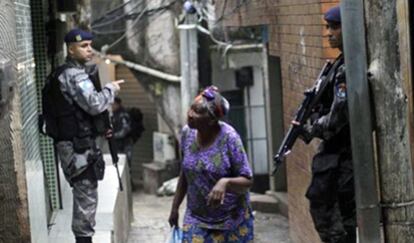Violence breaks out in Brazilian favelas ahead of Pope Francis visit
Rocinha was thought by police to have already been "pacified" thanks to special units


Just days ahead of Pope Francis’ scheduled arrival in Rio de Janeiro (Brazil), drug-related violence has flared up in a shantytown known as Favela Rocinha. The most-populated slum in the city, with at least 70,000 residents, it was thought by authorities to be one of the favelas that had already been pacified by special police units. While the pope will not be visiting the area, the deterioration of security is a matter of serious concern for Brazilian law enforcement officials ahead of the religious leader’s visit.
On Saturday night, in an operation dubbed Paz armada (Armed peace), dozens of police officers went up into the hillside slum with 58 arrest warrants against alleged drug traffickers still operating in Rocinha. There were 30 arrests and the police also uncovered as many as 100 drug sale points scattered all over the favela. Using surveillance cameras that were installed in Rocinha following its “pacification,” as well as information gleaned from social networks, the police were able to locate suspects in alleyways that do not even show up on Google Maps.
Rocinha has been divided into two major drug sale areas by syndicates that continue to fight each other just as they did before the favela was officially pacified by specially trained police units. Drug sales are still controlled and organized from prison by the infamous drug lord Antonio Bonfim Lopes, better known as Nem, who was arrested two years ago as he fled the favela during an enormous dragnet by military police and the three branches of the armed forces.
Rocinha, just like all of the other slums that are occupied by a Pacifying Police Unit (UPP), has had a permanent battalion of 700 police officers since its occupation in November 2011. But even this presence has failed to instill fear within the drug gangs.
Alarms went off when a German tourist was wounded with a firearm in Rocinha
According to police calculations, the drug business nets Rocinha’s kingpins three million dollars a month. This is a symbolic favela, not just because of its large population but also because of its strategic location between the noblest part of town, Leblón, and the prestigious area of Barra de Tijuca. At the foot of the hill is one of the city’s most upmarket hotels, the Intercontinental, which hosts international events; in August 2010, traffickers came down from the favela (which was still unpacified) and took 35 hostages among the hotel’s guests and personnel.
Rocinha’s geographic location, on a hilltop with fabulous views of the city, led dozens of foreign tourists to spend New Year’s Eve here last year to watch some of the world’s most spectacular fireworks, fired from Copacabana beach. A few days ago, the local press reported that a foreigner had purchased a home here for 300,000 dollars. And paradoxically, it may be the presence of foreign tourists that encouraged traffickers to go back to their old ways and start challenging the police again.
Alarms went off a few months ago when a German tourist, Daniel Benjamin Franck, 25, was wounded with a firearm in Rocinha, the same place where police now admit there are still around 100 drug operators.
The sad reality – that favelas which were pacified ahead of the 2014 World Cup and the 2016 Olympic Games continue to be run by drug gangs, as Rocinha demonstrates – pours cold water on an operation that was sold to the world as a shining example of police efficiency. And the nagging question is what will happen once these two major events are over and the favelas go out of the limelight.
What will the slums do when Pope Francis comes to Brazil? This is the top concern for authorities at the present moment. But given the religious culture of its hard-working residents, who have been a traditional target of social injustice, the most likely scenario is that if they were to come down from their shantytowns to see the pope, it would be to bring him flowers and ask him for some peace and dignity.
Tu suscripción se está usando en otro dispositivo
¿Quieres añadir otro usuario a tu suscripción?
Si continúas leyendo en este dispositivo, no se podrá leer en el otro.
FlechaTu suscripción se está usando en otro dispositivo y solo puedes acceder a EL PAÍS desde un dispositivo a la vez.
Si quieres compartir tu cuenta, cambia tu suscripción a la modalidad Premium, así podrás añadir otro usuario. Cada uno accederá con su propia cuenta de email, lo que os permitirá personalizar vuestra experiencia en EL PAÍS.
¿Tienes una suscripción de empresa? Accede aquí para contratar más cuentas.
En el caso de no saber quién está usando tu cuenta, te recomendamos cambiar tu contraseña aquí.
Si decides continuar compartiendo tu cuenta, este mensaje se mostrará en tu dispositivo y en el de la otra persona que está usando tu cuenta de forma indefinida, afectando a tu experiencia de lectura. Puedes consultar aquí los términos y condiciones de la suscripción digital.








































